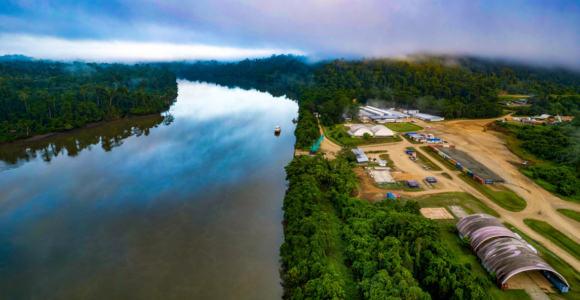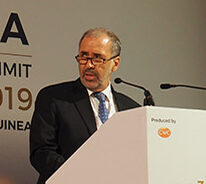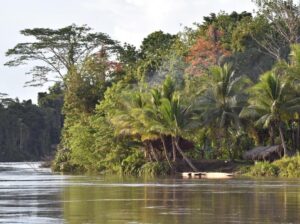A final investment decision on the Papua LNG project in Papua New Guinea remains on the agenda for this year. Managing Director of project lead TotalEnergies E&P PNG, Jean-Marc Noiray, walks Business Advantage PNG through the milestones ahead for the US$10 billion-plus gas project.

Downstream early works for the Papua LNG Project in PNG’s Gulf Province continue ahead of a final investment decision. Credit: TotalEnergies
While several factors have delayed the final investment decision on Papua LNG, Papua New Guinea’s second gas project, Jean-Marc Noiray, Managing Director of project lead TotalEnergies E&P PNG, says he’s “confident” the project will reach that landmark this year, “with all the lines of activity progressing well: technical optimisation, regulatory permitting, gas marketing and project financing”.
The front-end engineering and design phase for the upstream part of the project has been completed, and downstream work is being finalised, he tells Business Advantage PNG:
“We are now in a clarification negotiation, potentially reviewing some of the items which are costing more than we planned, to try to find alternatives,” he says.
Regulatory approvals
Noiray describes the process of permitting new petroleum and gas projects within the framework of PNG’s laws and regulation is “highly sophisticated and demanding”. It requires the completion of four processes to obtain the required Petroleum Development Licence (PDL): technical, national content, environmental and social.
The technical documentation of the project is subject to a due diligence review by PNG’s Department of Petroleum with the support of external experts. It is in progress, advises Noiray, based upon a set of documents submitted to the Department of Petroleum back in February 2023.
National content
With capabilities, capacity, and workforce within PNG more developed than for the country’s first gas project a decade ago, the PNG government and local business are keen to see more of the US$10 billion project budget spent locally.
“The financing market is becoming more demanding in terms of compliance, which is a good thing”
The Papua LNG national content plan was first submitted in June 2023 as a draft for review by the Department of Petroleum, and then issued in its final form in September 2023.
Noiray says the company has also made considerable progress toward meeting the plan, which includes programs to develop the local workforce, to provide access to opportunities for local companies and improve infrastructure for the local communities.
Environmental
Meanwhile, the Environmental Impact Study and management plans submitted since 2019 are in the final process of review by PNG’s Conservation & Environment Protection Agency and their experts.
It will culminate in the award of the Level 3 permit required for the granting of PDLs.

Total E&P PNG’s Jean-Marc Noiray. Credit: BAI
Social
TotalEnergies’ Social Mapping & Landowners Identification (SMLI) plan was submitted in September 2022. The Department of Petroleum completed its due diligence of this key document, enabling PNG’s then-Minister for Petroleum Kerenga Kua to formally issue a ministerial determination listing the clans confirmed as legitimate landowners in December 2023.
This is a key step towards the development forum currently in preparation, where the different benefits stated in the laws and agreements are shared between all the different entitled parties in a formal Benefit Sharing Agreement.
Gas marketing
Another pre-requisite for FID is locking in customers for the 5.6 million tonnes of gas the project is set to produce annually.
“Our ambition is to have an exemplary project from all points of view.”
Noiray tells Business Advantage PNG negotiations for the sale of gas on long-term contracts are “progressing well,” with several interested buyers.
Financing
Of course, Papua LNG must also meet its financing requirements, which include complying with the International Finance Corporation’s strict standards set out in the Equator Principles when assessing the potential impact of new fossil-fuel projects.
“The financing market is becoming more demanding in terms of compliance, which is a good thing, and helps us to achieve our goal of exemplarity” says Noiray. “It also demonstrates the important progress made by the oil and gas industry towards sustainability.”
Carbon footprint
While final approval for the project would trigger a wave of investment in Papua New Guinea and benefit local companies across the economy, international investors will first need to check off TotalEnergies’ plan to mitigate emissions and manage the social impacts of the project.
Credit: TotalEnergies
The construction of three electric LNG processing trains at the LNG plant at Caution Bay and the reinjection from day one of carbon dioxide from producing wells into the reservoirs (Elk and Antelope in Gulf Province), are two key technical choices made by TotalEnergies to lower the greenhouse gas emissions of the project.
The Papua LNG project has set an ambitious target of “Zero Net Deforestation”. It is designed to more than offset its deforestation impact by planting 1000 hectares over 5 years corresponding to more than 1 million trees, much more than the footprint of the project. To date, 200 hectares have been planted in degraded grassland areas.
“We don’t pretend that it will compensate in terms of biodiversity,” says TotalEnergies E&P PNG’s Managing Director, Jean-Marc Noiray. “We have other metrics that measure our impact on biodiversity and other projects to not only offset that impact but do more than offset the impact to reach the goal of net positive contribution to biodiversity in Papua New Guinea.”
Working with local communities to manage impacts and ensure benefits are shared is also key to the project’s success, says Noiray.
He says TotalEnergies has engaged continually with local stakeholders and formed an independent panel that includes environmentalists and anthropologists to gather external advice from recognised specialists, and to always improve environmental and social impacts.
“All this contributes to our ambition of an exemplary project in terms of human development, carbon footprint, biodiversity, sustainability,” he says.









Speak Your Mind